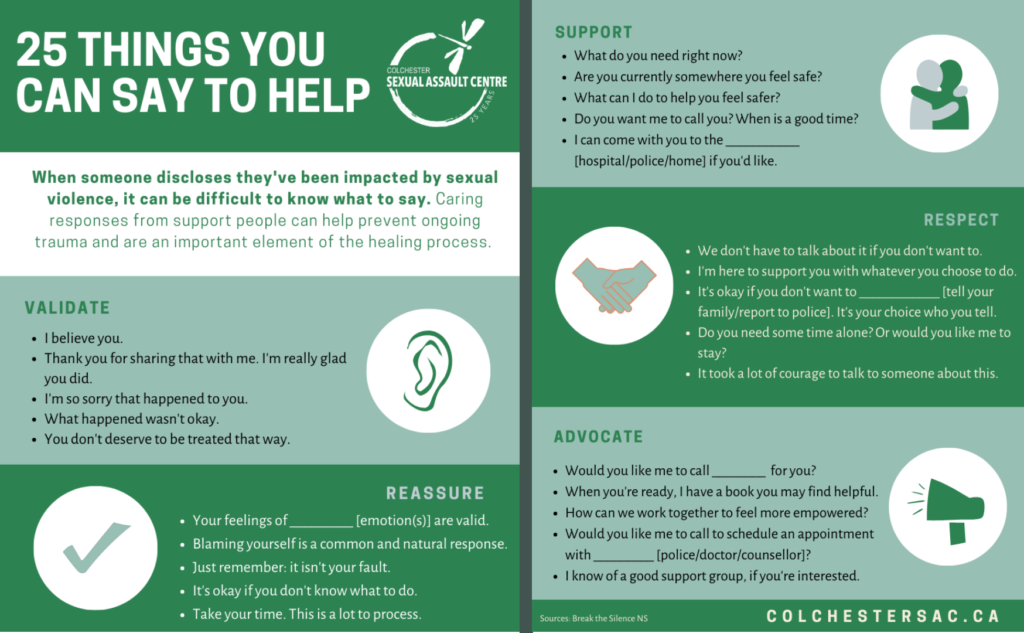Caring responses from support people can help prevent or lessen ongoing trauma and are a crucial element of the healing process. Support can mean many things and take many forms:
- Some people who have survived sexual violence may want someone to simply listen with compassion.
- If the assault was recent they may want someone to accompany them to see a Sexual Assault Nurse Examiner (SANE), to the emergency room, or a clinic to receive medical attention and/or to collect forensic evidence.
- Others may want someone who can support them long-term. This could include checking in regularly to see how they are doing, providing emotional support if they decide to report to the police and engage in the legal system, or accompanying them to counselling appointments.
The person you are supporting may not know what they need right away, and that is okay. Everyone is different, and each person impacted by sexual violence will have different experiences and needs. The following tips are meant to serve as a foundation to help you understand how to foster safer, caring, and non-judgmental interactions between yourself and the person you are supporting.
How to respond to a sexual assault disclosure

- Believe them — Thank them for sharing, reassure them they are not alone, and that you are there to listen and support them.
- “Thank you for sharing that with me. I’m really glad that you did.”
- “I’m here for you and I believe you.”
- “How do you feel?”
- “Is there anything you would like to talk about?”
- “Where would you like to start?”
- Validate their feelings — Reassure them the sexual violence was not their fault and that whatever emotions they’re feeling (e.g. confusion, anger, shame, disgust, numbness) are natural and that it’s okay to share them with you.
- “Your anger is completely legitimate.”
- “Blaming yourself is a common and natural response. Just remember, it wasn’t your fault.”
- “It’s okay, take your time. This is a lot to process.”
- Address immediate needs — Ask them how they want to be supported. People respond to sexual violence in different ways and have different needs. Asking what they need shows that you care about their wellbeing. If the person is in immediate danger, work with them to get them out of the situation, which could include calling 911, a crisis line, or other services.
- “What do you need?”
- “Are you currently somewhere that you feel safe?”
- “What can we do to make you feel safer?”
- “Do you want me to call you? Is now an okay time?”
- “Because of what you’ve been through, there are some medical issues we should think about. If you don’t want to talk about this now, that’s okay. Just know there are supportive places you can go when you’re ready. I can come with you, if you’d like.”

- Respect what they decide to do — You can review options with the person impacted by sexual violence, but don’t tell them what to do or try to influence their decision. Instead, empower them by respecting their choices about what actions (or not) they want to take. This helps to restore a sense of power and control to the person, something that was taken away when someone chose to violate them.
- “It’s okay that you don’t want to tell your family right now. I support you.”
- “You said you’d like to file a police report. Would you like me to come with you?”
- Share additional resources when they’re ready — It’s important not to push the person impacted by sexual violence to do anything they don’t want to do. This includes reporting to police or accessing mental health services. Trust that the person impacted by sexual violence knows what’s best for them. If and when they tell you they are ready to seek out additional support, you can help them sort through their options.
At CSAC, we have an excellent list of community connections on our website.
(Adapted from source: Break the Silence Nova Scotia)
External Resources:
At the Time of Disclosure: A manual for front-line community workers dealing with sexual abuse disclosures in Aboriginal communities — This manual by Public Safety Canada has been developed to assist front-line community workers, especially those in Aboriginal communities, deal more effectively with issues around sexual abuse disclosures.
Supporting Survivors of Sexual Violence: A Nova Scotia Resource — This training is designed to help you learn more about sexual violence and how to support someone who has survived it. It is for service providers, friends, family members, neighbours, teachers, first responders, counsellors, and anyone who is acting as a support person.


